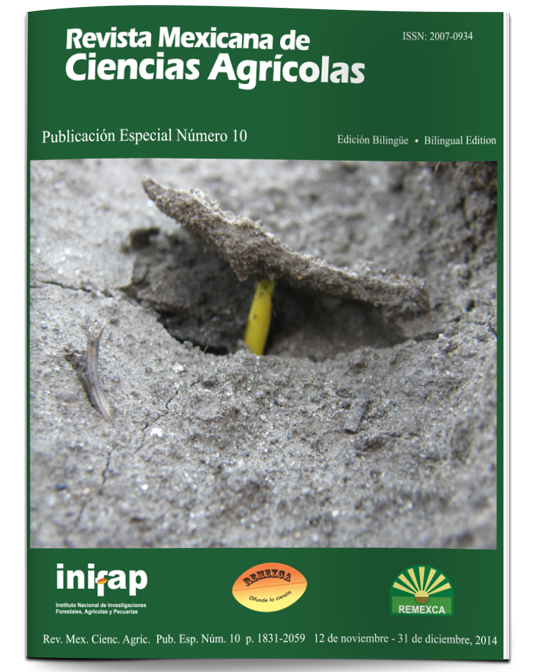Maize response to the environmental impact occurred in the stages of flowering and vegetative cycle
DOI:
https://doi.org/10.29312/remexca.v0i10.1042Keywords:
Zea mays L., ENSO, meteorologyAbstract
In Mexico, the influence of the phenomenon El Niño Southern Oscillation (ENSO) on the weather conditions governing the yield of crops, especially rainfed maize. For the maize producing region in the rainfed State of Nayarit, Mexico; there are no background that dimension the supposed inf luence. The objective of this research was to determine the impact of the phases of ENSO according to some meteorological variables on the period from planting to f lowering and vegetative cycle. Phenological data base of 15 years of records from the region of Santa María del Oro where INIFAP has placed periodic assessments since 1998 of commercial maize varieties were used. Quantifying the meteorology through the variables: precipitation, degree days of development, potential evapotranspiration, humid days and moisture content; which in turn were related by growing cycle of maize varieties and grouped according to the stage of ENSO that prevailed until the phenological stage of flowering. It was found that, the phases of ENSO influence on a deferred basis depending on the growing season. The Niña events are characterized by wet conditions contrary to the Niño phase. It was found that the early varieties showed differences in rainfall between the three phases of ENSO while the intermediate and late phase is differentiated only the Niño. The phases of ENSO clearly impinge on some meteorological variables which are important in the development of maize under rainfed conditions.
Downloads
Downloads
Published
How to Cite
Issue
Section
License
The authors who publish in Revista Mexicana de Ciencias Agrícolas accept the following conditions:
In accordance with copyright laws, Revista Mexicana de Ciencias Agrícolas recognizes and respects the authors’ moral right and ownership of property rights which will be transferred to the journal for dissemination in open access. Invariably, all the authors have to sign a letter of transfer of property rights and of originality of the article to Instituto Nacional de Investigaciones Forestales, Agrícolas y Pecuarias (INIFAP) [National Institute of Forestry, Agricultural and Livestock Research]. The author(s) must pay a fee for the reception of articles before proceeding to editorial review.
All the texts published by Revista Mexicana de Ciencias Agrícolas —with no exception— are distributed under a Creative Commons License Attribution-NonCommercial 4.0 International (CC BY-NC 4.0), which allows third parties to use the publication as long as the work’s authorship and its first publication in this journal are mentioned.
The author(s) can enter into independent and additional contractual agreements for the nonexclusive distribution of the version of the article published in Revista Mexicana de Ciencias Agrícolas (for example include it into an institutional repository or publish it in a book) as long as it is clearly and explicitly indicated that the work was published for the first time in Revista Mexicana de Ciencias Agrícolas.
For all the above, the authors shall send the Letter-transfer of Property Rights for the first publication duly filled in and signed by the author(s). This form must be sent as a PDF file to: revista_atm@yahoo.com.mx; cienciasagricola@inifap.gob.mx; remexca2017@gmail.
This work is licensed under a Creative Commons Attribution-Noncommercial 4.0 International license.



